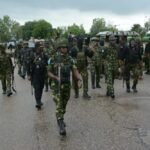The Senate Ad-hoc Committee investigating the N30 trillion Ways and Means emphasized the need to recover loans given by the Central Bank of Nigeria and Commercial Banks to the Federal Government during the previous administration.
Senator Jibrin Isah, who chairs the Committee representing Kogi East Senatorial District, engaged with Central Bank officials to push for the retrieval of outstanding loans that have not been repaid.
The Committee’s investigation focuses on loans, drafts, and advances provided to the Federal Government through the “Ways and Means” and “Anchor Borrowers Programme,” totaling N30 trillion and impacting the economy significantly.
During questioning by the Chairman of the Committee and other panelists, CBN officials, led by Deputy Governor Bala Bello in charge of Corporate Services, provided helpful tips on how funds were released at the request of the Federal Government.
Documents shared by the CBN officials revealed that the Apex governor unilaterally approved the release of funds instead of the Committee of Governors, COG, doing so.
This revelation upset members of the Committee, with the Chairman noting that valuable information had been obtained to guide future discussions.
Senator Isah maintained: “The Committee had issues with approvals in areas where it was discovered that the CBN governor “unilaterally gave approvals”, which is unusual to the Committee.
The Committee was unable to receive an immediate explanation, so they gave the CBN team 24 hours to provide the necessary information.
“We believe that every approval must be given by the Committee of Governors (COG) i.e the governor and his deputies. That is the standard rule.
“Where the governor alone unilaterally gives approval calls for questioning. I think they will provide answers for us very soon,” he said.
The Anchor Borrowers program, totaling N1.1 trillion, has a repayment rate of 70%, with the remaining 30% (N358 billion) being loans given to high-risk, low-income farmers.
Senator Jibrin expressed concern that low-income farmers may not have the necessary resources to meet performance expectations in terms of “equipment, technical know-how to manage those farms effectively. That is where we are going to have possible problems of loan default of about N358 billion”.
The committee mentioned that if the loans were processed through commercial banks, then the credit risks are the responsibility of the commercial banks. They also suggested that the commercial banks should pursue the borrowers to recover the money lent to them.
“We have advised them that they should try into round table discussion with those commercial banks that purportedly guaranteed those loans.
“To the extent that those loans have been guaranteed and those commercial banks are still in existence, the credit risks lie with the commercial banks and they know what to do,” he added.





